Please activate JavaScript in your browser to use all interface options.
Rosneft supports projects to study and protect rare bird species
01 April 2024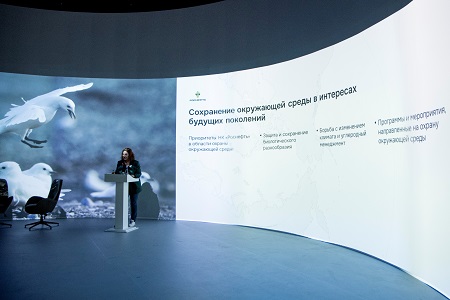 International Bird Day takes place on April 1. Rosneft and the Company’s enterprises implement projects to study and protect birds in the Arctic, the Volga region, Eastern Siberia and the Far East.
International Bird Day takes place on April 1. Rosneft and the Company’s enterprises implement projects to study and protect birds in the Arctic, the Volga region, Eastern Siberia and the Far East.
Bird Day is part of UNESCO’s Man and the Biosphere program and aims to raise public awareness of the importance of protecting birds, whose disappearance causes irreparable damage to the Earth’s ecosystems. Rosneft has been a member of the UN Global Compact for more than 10 years. The Company annually reaffirms its commitment to 17 UN Sustainable Development Goals, including Goals No. 14 “Life Below Water” and No. 15 “Life On Land”.
As part of the grant program of the Komsomolsk Refinery (part of Rosneft’s refining complex), ornithologists of the Zapovednoe Priamurie Nature Reserve are implementing the “Under a Strong Wing” project to study and conserve the population of the red-listed Steller’s sea eagle. 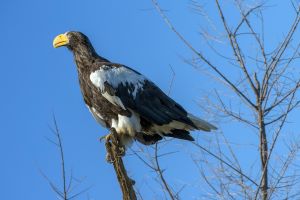 On the eve of the nesting season, scientists from the reserve, together with ecologists from the Komsomolsk Refinery, began installing audio and photographic equipment. Monitoring Steller’s sea eagles will allow a detailed study of the population of one of the largest birds in the world, which is found only in the Far East. The data obtained will form the basis for further research and development of environment-oriented measures. 14 photo-audio traps were purchased with the grant. The first remote monitoring devices have already been installed in the places where the birds are most likely to nest: the Shargol Channel along the Amur River and at the Gorin River headland.
On the eve of the nesting season, scientists from the reserve, together with ecologists from the Komsomolsk Refinery, began installing audio and photographic equipment. Monitoring Steller’s sea eagles will allow a detailed study of the population of one of the largest birds in the world, which is found only in the Far East. The data obtained will form the basis for further research and development of environment-oriented measures. 14 photo-audio traps were purchased with the grant. The first remote monitoring devices have already been installed in the places where the birds are most likely to nest: the Shargol Channel along the Amur River and at the Gorin River headland.
RN-Uvatneftegaz awarded a grant to study biodiversity and assess the sustainability of bird communities in the Irtysh River valley in Uvatsky District. As part of the project, a comprehensive ecological analysis of the avifauna of the surveyed biotopes in Uvatsky District of Tyumen Oblast was carried out for the first time. Ornithologists observed 117 species of birds belonging to 14 orders, and the distribution of bird species by feeding and nesting type was also revealed. Based on the results of the project, recommendations were developed to optimise the use of bird habitats and nesting sites in the district. Ecologists compiled a list of rare and declining bird species, carried out a series of biotechnical measures: artificial nesting and flight sites were installed, and a set of informational and educational postcards “Birds of Uvatsky District” was produced.
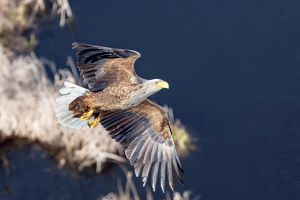 In November 2023, Rosneft’s Samara Group (Samaraneftegaz, Novokuibyshevsk Refinery, Kuibyshev Refinery, Syzran Refinery, Novokuibyshevsk Petrochemical Company, Novokuibyshevsk Oils and Additives Plant) held a competitive selection of grant projects. The winner was Samarskaya Luka National Park with a project to study the nesting sites of the white-tailed eagle in Samara Oblast.
In November 2023, Rosneft’s Samara Group (Samaraneftegaz, Novokuibyshevsk Refinery, Kuibyshev Refinery, Syzran Refinery, Novokuibyshevsk Petrochemical Company, Novokuibyshevsk Oils and Additives Plant) held a competitive selection of grant projects. The winner was Samarskaya Luka National Park with a project to study the nesting sites of the white-tailed eagle in Samara Oblast.
During the project, ornithologists will monitor the status of the white-tailed eagle population and identify nesting sites with the help of volunteers. The project will establish the exact location of the nests and determine key demographic indicators – the number of eggs in the clutch and the number of hatched chicks. Based on the data collected, the scientists will develop proposals for further conservation measures, including optimising tourist flows in Samarskaya Luka. Such measures will make the national park a favourable nesting site for the white-tailed eagle and help to maintain the population at the level of the entire Middle Volga region.
RN-Vankor (operator of Rosneft’s flagship Vostok Oil project) organised a scientific expedition to the Taymyrsky Dolgano-Nenetsky District of Krasnoyarsk Krai, where scientists studied populations of wild geese, including those listed in the Red Book of the Russian Federation. The large amount of data collected during the fieldwork will provide an overview of the current population status and nesting sites of geese species. 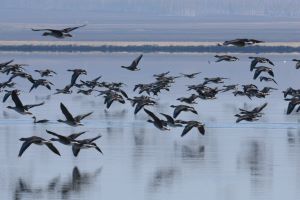 The outcome of the work will be recommendations for their protection.
The outcome of the work will be recommendations for their protection.
The Evenkiya Geese project was implemented as part of the East Siberian Oil and Gas Company’s grant program. Ornithologists studied brant goose, lesser white-fronted goose and bean goose, which are listed in the Red Books of the Russian Federation and Krasnoyarsk Krai.
Rosneft, together with the Arctic and Antarctic Research Institute, is conducting research on Ivory gull in hard-to-reach areas of the Kara Sea islands: Vise, 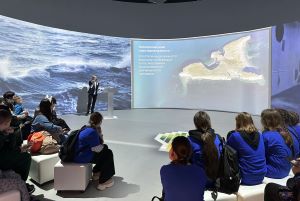 Golomyanny, Sredny and Domashny since 2020. The 2022-2023 period included aerial surveys, ringing of adult Ivory gulls, installation of GPS trackers and collection of biological material.
Golomyanny, Sredny and Domashny since 2020. The 2022-2023 period included aerial surveys, ringing of adult Ivory gulls, installation of GPS trackers and collection of biological material.
Images of rare bird species of the Russian North, taken in the Arctic seas by participants of Rosneft’s scientific expeditions, were displayed at exhibitions in the Apothecary Garden and on Nikitsky Boulevard in Moscow.
Rosneft plans a new stage of Arctic ecosystem research in 2024-2027. This time the focus is on the north of Krasnoyarsk Krai, where scientists will map the environmental sensitivity of the shores of the Yenisey Gulf, the adjacent waters of the Kara Sea and the Brekhovsky Islands National Wildlife Refuge. This will allow to develop measures to protect the most important habitats for the red-listed and other valuable bird species: white-billed loon, white-tailed eagle, peregrine falcon, Bewick’s swan, red-breasted goose and lesser white-fronted goose. During the nesting season, observations will be made on boat routes in the reserve.
Rosneft also spread awareness among the public. In February, the Company presented environmental atlases prepared jointly with the non-governmental development institute Innopraktika at the Russia International Exhibition and Forum at VDNKh. The “Seabirds of the Russian Arctic” atlas received special attention. The book introduces species of seabirds and seaside habitats of the Arctic and contains descriptions of 62 species inhabiting the area from the White Sea to the Chukchi Sea. The visitors of the Rosneft’s pavilion were able to attend the lecture “Arctic ecology from the height of the Ivory gull’s flight” and get acquainted with the series of popular science lectures “Flight above the ice. Seabirds of the Russian Arctic”. The course is available to everyone on the Lectorium educational platform.
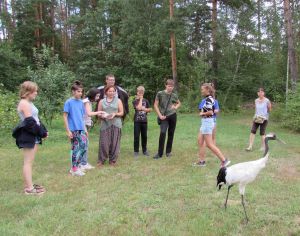 Ryazan Oil Refining Company (part of Rosneft’s refining complex), organises expeditions to the Oksky State Natural Biosphere Reserve for young researchers in the course of its long-standing cooperation with the children’s public environmental organisation “Master of Meshchera”. Schoolchildren take part in Crane’s Day, learn about the habits, lifestyle and program of the restoration of crane population, including one of the rarest species – the Siberian Crane, which is listed in the Red Book. This bird species is endemic to the northern territories of Russia.
Ryazan Oil Refining Company (part of Rosneft’s refining complex), organises expeditions to the Oksky State Natural Biosphere Reserve for young researchers in the course of its long-standing cooperation with the children’s public environmental organisation “Master of Meshchera”. Schoolchildren take part in Crane’s Day, learn about the habits, lifestyle and program of the restoration of crane population, including one of the rarest species – the Siberian Crane, which is listed in the Red Book. This bird species is endemic to the northern territories of Russia.
Rosneft
Information and Advertising Department
April 1, 2024

-315xx70.png)

